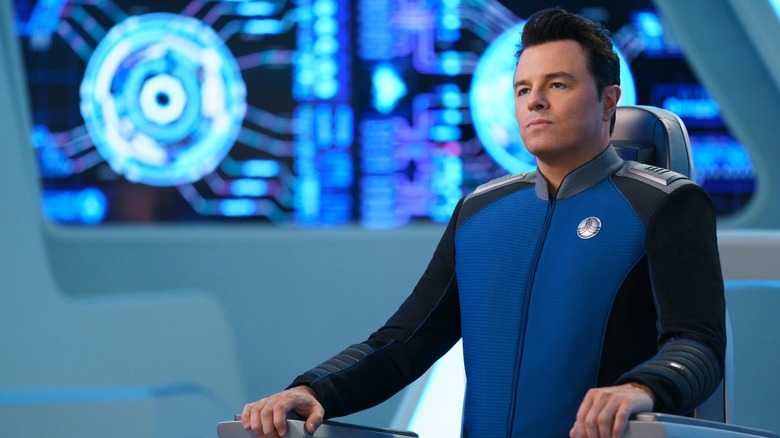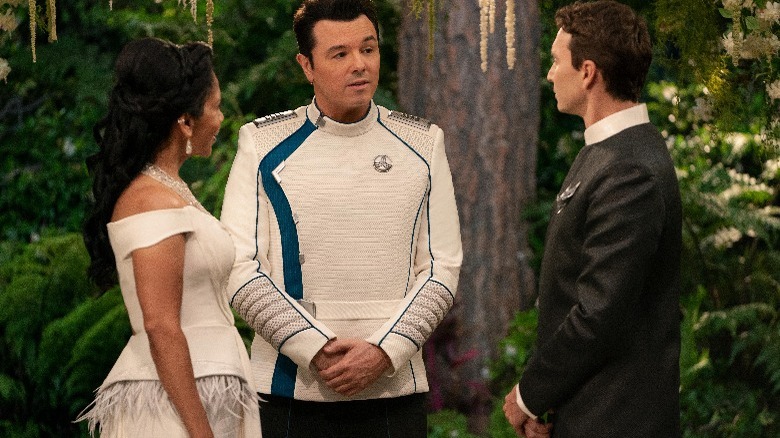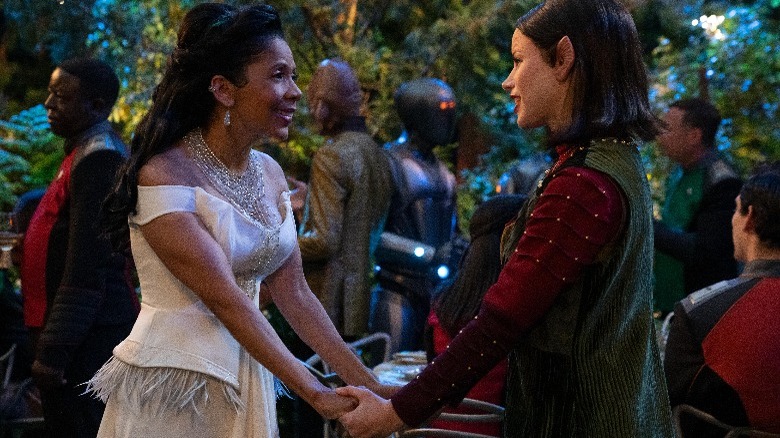Seth MacFarlane Didn't Want The Orville To Try To One-Up Itself
Warning: Major spoilers ahead for season 3 of "The Orville."
Seth MacFarlane's "The Orville" is a sci-fi spectacle that takes inspiration from "Star Trek" and other space dramas, but the core of the show is its complex characters. Season 3 of the show, which dropped on Hulu two months ago, continues the story of the USS Orville and its crew's struggles to maintain peace in the galaxy. The Kaylons attacked the ship at the end of season 2 as a part of their plan to destroy biological life-forms, but the crew members managed to survive with the help of Isaac (Mark Jackson), a Kaylon himself.
MacFarlane chose to open season 3 of the show by shifting the focus back to its characters, who are members of factions that have their own socio-political motivations. In an interview with SYFY WIRE, MacFarlane explained the reason behind ending season 3 with Isaac and Dr. Claire's (Penny Johnson Jerald) wedding instead of an epic space battle like the one featured in episode 9, "Domino." He clarified that the aim was not to one-up the spectacle of "Domino" within the same season and end the show with an affirming moment that gave the characters their due.
Here's how MacFarlane unfurled the high-intensity action in "Domino" and decided to end the season on a grounded note, which allowed the characters aboard the ship to interact with one another in authentic ways.
Why season 3 doesn't end with an epic space battle
MacFarlane set up "Domino" as a turning point in the latest season, as it subverts the expectations of established alliances in the show. With the Kaylons actively preparing to annihilate all biological life forms, the rest of the galaxy is in a state of unrest. The crew aboard the Orville, along with the Planetary Union, are trying to come up with a plan to defuse the situation, while the Moclans and the Krills are setting up their own negotiations to prevent the imminent war.
Long story short, the Moclans and Krills wish to use a destructive weapon to exterminate the entire Kaylon race in retaliation, and almost everyone aboard the Orville, including Ed Mercer (MacFarlane), is against this. A shift in alliance takes place, as the crew, who had always been allies with the Moclans, decide to ally with the Kaylons instead to stop potential mass genocide. A meeting with the Kaylon Primary leads to negotiations that they will stop their plans for war immediately and ensure peaceful coexistence with other alien races. The Kaylons agree.
The sheer scope of "Domino" is massive, as it demonstrates how the domino effect can quickly change political landscapes and turn the odds against a certain group. Instead of trying to one-up this premise, MacFarlane told SYFY about his decision to go for a more traditional "happy ending" for the finale:
"On the one hand, there was just no way — at least this year — that we could top what we did in 'Domino.' On the other hand, it just seems wonderfully unconventional to do it [the ending] that way. The strength of this show, despite how much the scope has increased, is still the characters. I think that's why you watch any show. "
How the ending pays its dues to the characters
As explained by MacFarlane above, "The Orville" has always been about doing right by its characters and the relationships that they share with one another. By concluding the season with Isaac and Claire's wedding, the show not only gives them the happy ending they deserve, but also allows the rest of the crew to unwind after the tense events of the previous episodes. The galaxy just managed to evade a full-scale war, and instead of challenging the crew with yet another galactic problem, the show brings them together in a familial, intimate setting, where their bonds with one another can blossom.
As season 4 of "The Orville" has yet to be greenlit, MacFarlane wanted to end season 3 on a hopeful note, keeping the ending open-ended enough for new challenges to be introduced in a potential new season. There are many narrative threads that still warrant resolution, but all of that takes a backseat in "Future Unknown," the show's season finale. As it was ultimately Isaac's love for Claire that helped thwart the first Kaylon attack, it is fitting to have the final episode celebrate this union, as it is a symbol of a new era of peaceful co-existence.
MacFarlane's aim of telling "stories that needed nothing but these personalities interacting with each other" does pay off in the end, as that is truly the "nucleus" of the show. Sure, "The Orville" has its big CGI space battle moments, with shady space politics and badass fight sequences in motion. While these strictly sci-fi moments are fun to watch and add immensely to the appeal of the show, the interpersonal dynamics between the characters act as the icing on the cake. After all, that ending was earned, and earned well.


